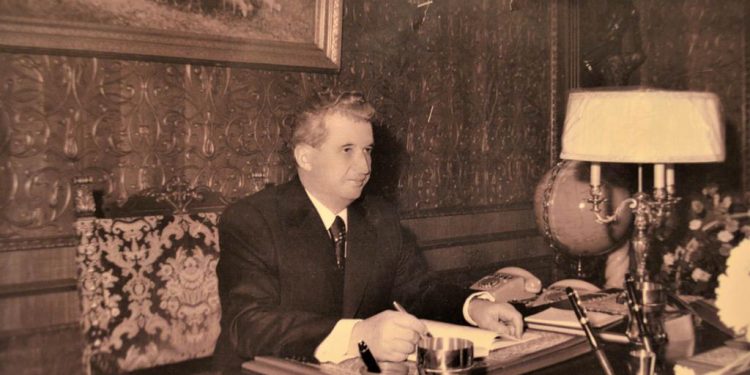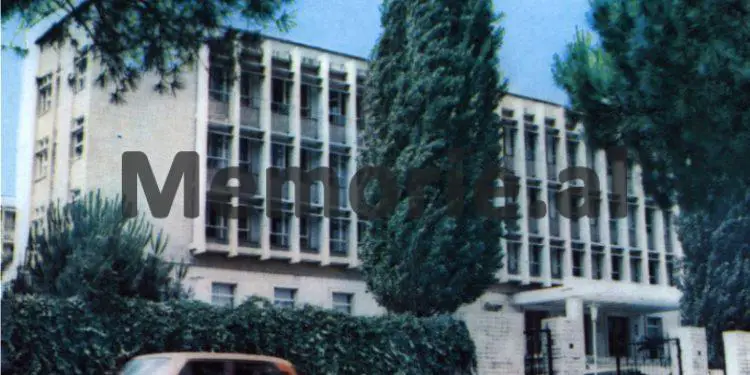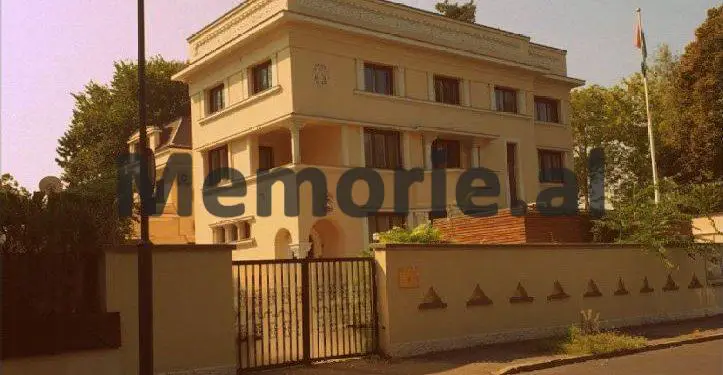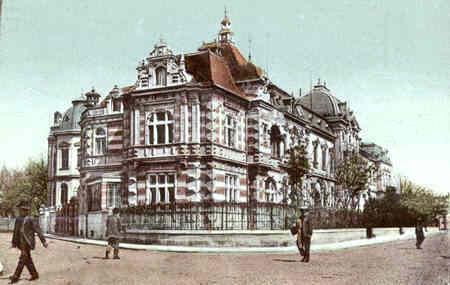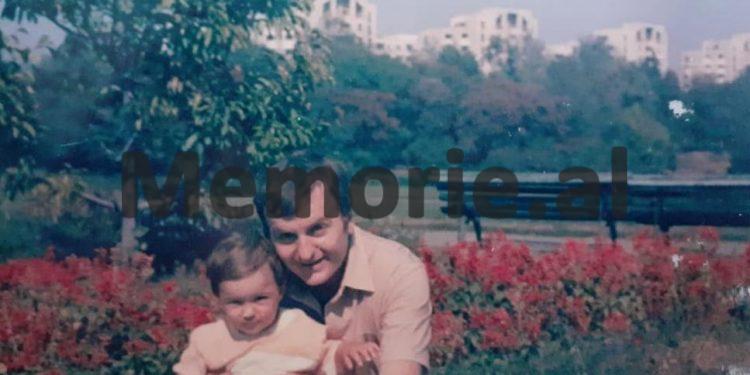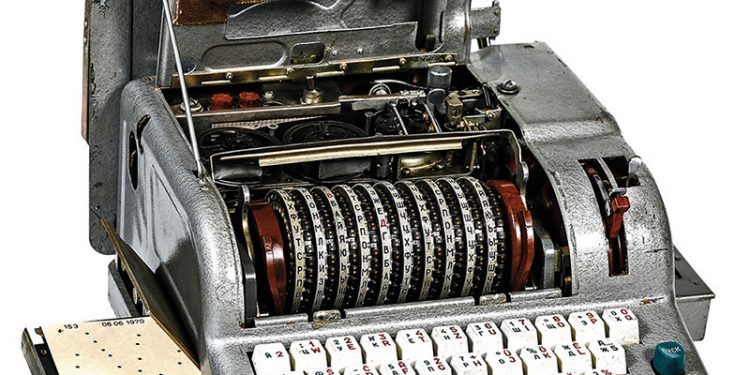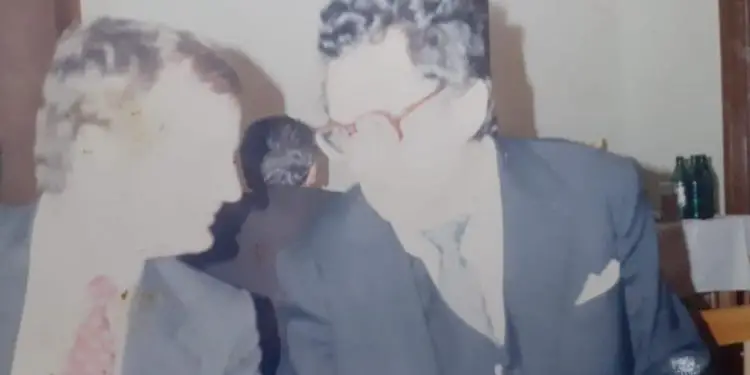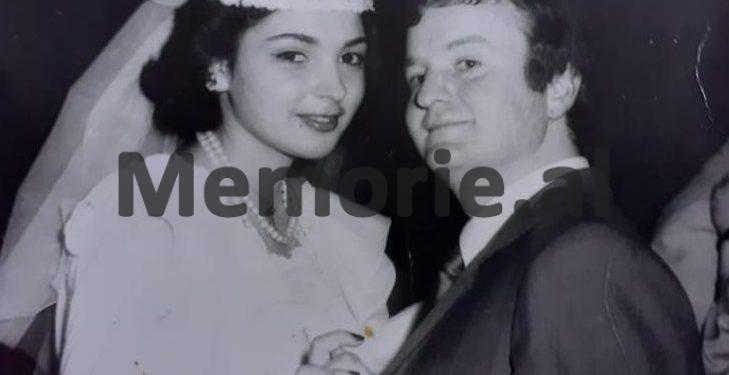Dashnor Kaloçi
The third part
Memorie.al/ publishes the unknown story of the mass protests of the Romanian people at the end of December 1989, which led to the overthrow of the communist leader, Nicolae Ceausescu, who had ruled the country since 1965, after the death of George Dezhit. Rare testimonies of the well-known journalist and moderator, Rezar Xhaxhiu, who from 1987 to March 1991, served as Press and Culture Attaché at that embassy, which exclusively tells Memorie.al, making public for the first time, how the staff of that embassy, led by Ambassador Pirro Vito, experienced the sensational events of the mass protests of the Romanian people, where for several days in a row, the staff of that diplomatic headquarters was forced to take up arms and take up positions in different parts of that building? What messages did they receive from official Tirana through the Ministry of Foreign Affairs and how did they get through the most difficult moment, when the Albanian embassy was surrounded by Army tanks commanded by General Vasile Milea who had joined the protesters, after the news broke that the dictator Romanian, Ceausescu, with his wife, Helena, were sheltered in the basements and tunnels of that embassy?!
“I remember that all the relatives of the staff of our embassy, had gathered together and stood in the basements of that building, under a real uncertainty and panic, of what could happen in the following hours! Meanwhile, that part of our families who had taken refuge outside the embassy building, experienced twice as much and more fearfully, the battle of several days on the streets of Bucharest. I remember my friend, whom I found every time I came back from the embassy, terrified and stiffened by panic, fear, and insecurity. At the time, we had a 6-month-old daughter, and I often found them both under the window sill, to escape the bullets coming from everywhere. It was fired from all sides, and those who were most treacherous were the Securitates’ USLA (Special Anti-Terror Department) snipers, which were placed on the terraces of palaces, and official buildings. But in many cases, it was not known who was shooting?! It was Christmas Eve, December 25, 1989, when we learned of Ceausescu’s arrest. He and his wife, Elena, were stopped by an army checkpoint near Tirgovishte. “During this moment, the presidential couple Ceausescu, was heading to an airport, trying to escape from Romania, and seek political asylum in a country friendly to Romania.”
This is how the well-known journalist and moderator Rezar Xhaxhiu remembers, among other things, the sensational events that took place three decades ago in Romania, where at the end of December 1989, due to the mass protests of the Romanian people in the capital of the country. , Bucharest, communist leader Nicolae Ceausescu and his wife, Helena, were detained at a checkpoint on the outskirts of a small town on the border with Hungary in an attempt to flee the country. executed after a ‘flash’ trial!
Located in the ranks of the diplomatic service (as Attaché of the Press and Culture), near the Albanian Embassy in Bucharest since the beginning of 1987, as an eyewitness, Xhaxhiu, had the opportunity to follow closely the protests of the Romanian people, which led to the overthrow of dictator Nicolae Ceausescu, who had ruled that great Balkan country since 1965, after the death of George Dej.
How was Rezar Xhahiu selected to serve in the ranks of Albanian diplomacy, who were the other colleagues he worked with from 1987 until March ’91 when he returned to his homeland, how did the work at that diplomatic headquarters work? and how the staff of that embassy, led by Ambassador Pirro Vito, experienced the sensational events of the mass protests of the Romanian people in late December 1989, where for several days, the staff of that diplomatic headquarters was forced to arm themselves and took positions in different parts of that building?
What messages did they receive from official Tirana through the Ministry of Foreign Affairs and how did they get through the most difficult moment when the Albanian embassy was surrounded by Army tanks commanded by General Vasile Milea, after the news broke that Romanian dictator Ceausescu and his wife his, Helena, were sheltered in the basements and tunnels of that embassy?!
Regarding these and other unknown events that took place in the Albanian embassy accredited in Bucharest in the period, 1987-1991, Rezar Xhaxhiu tells us for the first time, in this exclusive interview for Memorie.al, which will follow in some consecutive numbers.
Followed by the last number
Mr. Xhaxhiu, what were the features and characteristics of Romanian society that stood out the most in the late 1980s when you served at the Albanian Embassy in Bucharest?
It was an open but oppressed society, the Romanians were a people who performed religious rites freely, but were forbidden to meet foreigners, even tourists. A simple Romanian, he had a private car, but he was monitored non-stop, and he should not express any opinion of his own, free and independent.
Did you discuss with the embassy colleagues about the bad situation that was there?
We were diplomats and did not suffer the poverty of the ordinary Romanian, but that would not prevent us from touching him closely. Our neighbors were from different walks of life, doctors, military, teachers, workers, etc. So, we knew and touched him closely, what their life was like. But only that. No other impact of this bad economic and social situation, affected us in our daily work, as well as in our living conditions there.
How was the daily routine of working for a diplomat like you, in one of the main communist countries of the Balkans and Europe?
A typical office treadmill. As in the Ministry of Foreign Affairs, with the same schedules and obviously the same discipline. We were dealing with drafting notes, verbal notes, grade answers, organizing activities and official celebrations. We also organized meetings with diplomatic colleagues, held banquets with various cocktails and receptions. This was the typical day of a diplomat, who at the end of it, had to in one case makes a report on Tirana, regarding the developments in the country, and in another case, send another telegram, also to the Ministry of Foreign Affairs for a meeting, a message, or a conversation of interest he had had with a western, eastern colleague, or with one of the Romanian officials. And this telegram was being compiled in the ‘Black Room’.
Can you explain to us, more specifically, what this Black Room was?
The Black Room was a room two meters wide and three meters long. This room was completely covered with thick, black meringue. This meringue served to avoid possible answers, and the ‘bugs’ (eavesdropping devices) that were thought to have been installed by the Romanian Secret Service (Securitate), on the walls of the room. That room, was like a dungeon but without windows, something like a black grave.
And how could you work in an environment with such conditions?
Of course, in these conditions, we were forced to work. Telegrams and memos were written on a table surrounded by that black cover. And this shelter, which was illuminated by a small searchlight, isolated that covered surface, even from the room where we worked…!
As is well known, communist Romania had one of Europe’s most infamous secret services, called the Securitate. During the time you were there, did you feel that you were under surveillance by its members?
Under observation yes, but not visibly. Everything was done at a distance, and it is not that we were looking to be put behind a car, or chased, by certain persons. At least some of the embassy staff were safe, like my job or Marco Bello’s. So, we came from the ranks of the Ministry of Foreign Affairs and not from the sector of the Directorate of Political Intelligence (which was one of the three directorates of State Security).
Were there strict protocol rules that you, as an embassy employee, had to follow?
There were as many rules as you want. Those were good rules, but sometimes they could even seem like endless absurdities!
Can you name some of these rules?
For example, we had to notify the embassy of our every move in or out of Bucharest. We also had to announce every invitation that came from our colleagues for various banquets, lunches and dinners. Whether they are organized in their homes, or in the reception facilities of the respective embassies. Our wives definitely had to go out accompanied by their Albanian colleagues, in all the moves they made. You had to have a dignified outfit, even outside of working hours. Thus, for example, in our country it was forbidden to wear jeans, because they were considered something fashionable…! (Laughing).
During your time there, did you meet with senior Romanian officials?
Of course, yes. Our work wanted all of us to have contacts with senior Romanian government officials. Ministers, or various Deputy Ministers, directors of directorates, etc., etc., who had to do with Albania, or with its problems.
What did they think of Albania, and did they convey to you the conversations about the tense climate that communist Romania was going through?
Various Romanian officials and diplomats, but not only, conceived of Albania as a very interesting country, in terms of its official attitudes, not only towards the Soviet Union, but also towards the United States. They admired our country, as a country that had an early tradition of friendship with Romania thanks to a colony of Albanians who lived and worked there for many years. Albania was considered a country with which they shared common positions, but also as a country that has constantly produced people of war and faith. But about the plight their country was going through, they hardly spoke at all.
Specifically, what made you spit on them from our country?
What stood out most was the fact that they called Albania, as a country that produced the best cognac on the planet. That cognac “Skanderbeg” with which, you can solve all your personal problems, but also open all the doors to you at every level of the Romanian administration. Cognac was the means by which we broke the ‘blockade’ in Bucharest…! (Laughing).
Can you tell us some spicy episodes from the meetings you had with Romanian and foreign officials and diplomats?
One of the strictest rules we had to follow during our mission there was not communicating and not even giving a hand to the diplomats of the United States of America, the Soviet Union, and Israel. During the various receptions and cocktails, which were numerous at the time, this put us as diplomats in extremely difficult, often even ridiculous, situations.
Have you ever encountered these uncomfortable situations?
Definitely, sometimes even. I remember once during a reception, I was among a group of diplomats from eastern and western countries, where suddenly, a colleague of the Soviet embassy approached me. He, after giving his hand to all who were in that close circle, extends his hand to me as well. This thing forced me to leave, seemingly stylish, but which left a bitter, and strange taste to those present in that circle of diplomats.
In these cases, what did other diplomats say to you when they saw you doing this?
In this group, there was also a diplomat from the North Korean embassy, who, a little later, addressed me, asking me the meaning of this strange act, according to him. I tried to explain the iron rule of our center (Ministry of Foreign Affairs in Tirana) to the officials of these three countries. He laughed with that typical Asian smile and said to me literally: “We also have such a rule towards our South Korean colleagues, but we are a little more moderate than you, in our behavior.” Surprised, I asked him about this Asian moderation style and he replied, “Well, when we are in front of them, we do not shake hands, but at least we say some general words, which have to do with the weather, the rainy weather, or the frost, the increase of sparrows in Bucharest, etc., etc. I laughed out loud, saying: ‘this is the typical Asian style of your diplomacy, which is completely different from the Balkan one’! And what more could I say to a North Korean diplomat than just jokingly. But after 1990, thankfully, I had the opportunity to explain in one way or another to the diplomats of these three countries, this absurd rule of Albanian diplomacy.
Can you explain more specifically what happened to this reception that you had with the diplomats of the US, Russia, and Israel?
Yes, of course. If I am not mistaken, in the first months of 1991, when the communist regime in Albania had just fallen, our country had restored diplomatic relations with Washington, Moscow, and official Jerusalem. At a regular reception hosted by our embassy, on the occasion of the re-establishment of these diplomatic relations, one of the diplomats of the American embassy in Bucharest suddenly comes to me, and addresses me as follows: “Hey Mrs. Uncle, my Albanian friend, can I shake your hand tightly, because diplomatic relations have been restored between our two countries, and you Albanians will no longer label us Americans as “Gendarmes of international imperialism” ?! We both laughed out loud, as I was surprised by this American phrase, which, to me, resembled the jargon of Hosten magazine. And we met cordially with him, to discuss various things afterwards. I was also fortunate enough to apologize to the Russian and Israeli diplomats after the American diplomat for apologizing for the “crazy rule” of not shaking hands.
What about your embassy colleagues, did you feel you could be monitored, at some point?
Realistically, in all the receptions and cocktails, but also in the various activities, you had to be very careful that one eye was watching, and at any moment, was ready to report any deviation of yours, to these absurd rules that had been set in Tirana. It was a dangerous game because you did not know where the unexpected would come from.
Have you had concrete episodes when you and your family felt threatened at any point, by these strict rules?
One of the idiocies at least, as I conceived it at the time, was the strict ban on only the wives or relatives of diplomats going out. Still today I cannot understand the real reason for this absurdity! The first surprise happened to me shortly after I arrived in Bucharest. My wife at that time, was a young girl somewhere between the ages of 19-20, as well as a bit rebellious by nature, which meant that she did not easily agree with these idiocies, as she described them. And shortly after I arrived in the Romanian capital, she was moving quietly through the boulevards and warehouses of Bucharest. This happened for several months, until one day, I was spotted on the streets by the women of the embassy, who were going by car to make purchases together. That was enough for a telegram to go to Reiz Malile, who was then Foreign Minister. The telegram called for action against the diplomat, whose wife had committed the heresy of going out only through the streets of Bucharest.
How did that problem end?!
Later, I learned that my father had a friend, Reiz Malilen, at the time. He had intervened to resolve this issue with a remark, of the “ajami youth”, which seems to have been accepted humanely, by Minister Malile. But this measure is not that it corrected my wife, who found new paths to her freedom, and moving through Bucharest, (laughs).
During the period you worked there, did you have contact with ordinary Romanians. And if so, what did you talk to them about about the bad situation Romania was going through?
Since we lived in palaces and stairs with the Romanians, we had frequent but careful contacts with them. So, my wife, had a friend of hers on the stairs, where she often went secretly to other Albanian neighbors of the embassy. She befriended this good Romanian, and still maintains occasional relationships.
From as many contacts as you had, what were ordinary Romanians like?
Ordinary Romanians were very loving, suffering, but very dignified and very cultured people. They often cried, for their conditions, but very carefully. They complained a lot about the communist regime, the economic situation, and the repression of the secret police, the ‘Securitat’. But even this, they did it with prudence and dignity, which was to be envied./Memorie.al
Continues tomorrow




